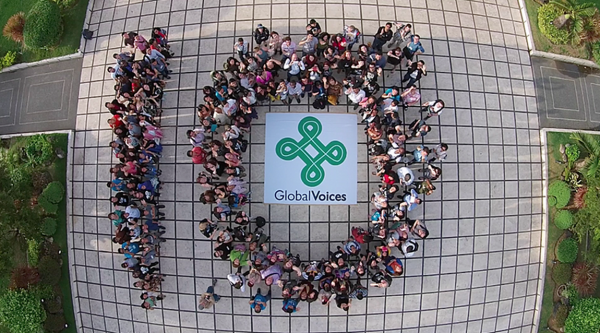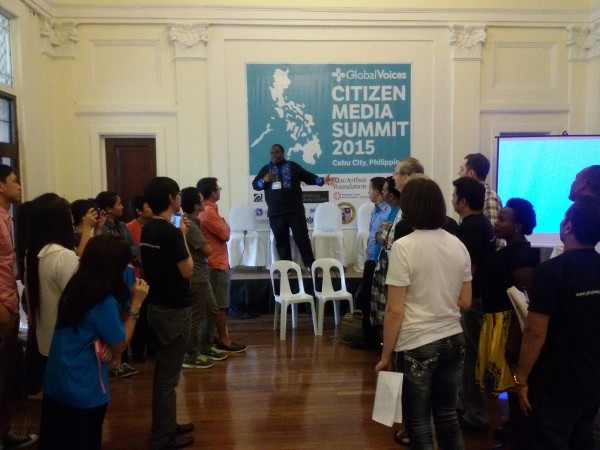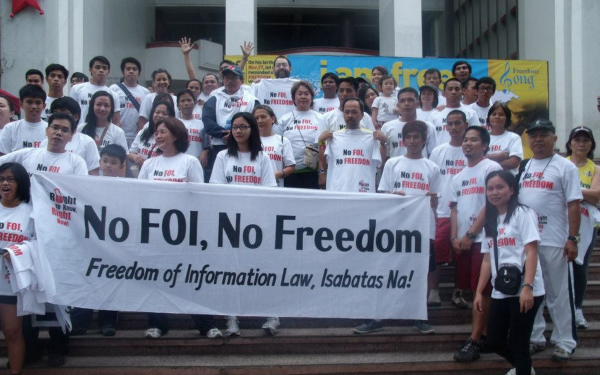Last week in the Philippines, at the Global Voices Media Summit 2015, bloggers, activists, journalists, and actors from civil society, international organisations and government came together to explore connections between the open Internet, freedom of expression and online civic movements.
Making All Voices Count supported the summit and led sessions on the opportunities presented by – and the challenges in enacting – freedom of information laws that benefit all citizens. Programme Officer Hyshyama Hamin reflects on her experience at the summit and the questions that were raised.
Freedom of Information Legislation is just the start
Freedom of Information (FOI) legislation is a fundamental tool to enable social accountability and support anti-corruption efforts. It can help governments to be transparent about what they do and trigger citizen engagement in monitoring of budgets and the delivery of services among other things.
On Day One, activists and government representatives gathered to discuss how freedom of information laws can be made to work better for all citizens.
Governments from Hungary to Mexico have passed laws on the right of access to information, and in this session we explored how journalists, bloggers, and human rights activists try to use these laws to shine light on government activities – and the challenges they face in doing so.
Executive Director for the Philippine Centre for Investigative Journalism, Malou Mangahas, reflected on the process of getting FOI legislation passed in the Philippines, noting:
In this context, freedom of information, freedom of expression, internet freedom are integrally connected, therefore rights offline, should also be rights online…The right to know is the bedrock and enabler of other rights; to education, health, livelihood, land, property, life and so on.
She also discussed the difference between government uploading documents online and genuine freedom of information, adding that efforts by the government to disclose information are ‘not good enough’.
Transparency has been claimed by the current government in that has actually sustained the effort to post public and budget documents online – but it seems to suggest that this is a substitute for FOI.
On Day Two, myself and Daudi Were, Making All Voices Count’s Director of Innovation, facilitated a workshop discussing how technology and innovation can support the application of FOI laws in the Philippines.
Nepo Malaluan, co-convener of the Right to Know Right Now Coalition, a leading voice in advocating for FOI in the Philippines, led a dialogue on the range of activities currently being run on the issue. Along with actors from Witness, Global Voices, Amnesty International and Hivos, Malaluan discussed proposals for the next steps needed to strengthen FOI in the Philippines.
He highlighted how groups within the Right to Know Right Now coalition have already begun practicing requesting information from relevant government agencies. The coalition is documenting this process to establish an evidence base to demand for information and the impact of that information (when obtained or denied) on the work of organisations and individuals requesting it.
Supply and demand are out of sync in Open Data
Both sessions brought up important discussion points around the demand for government data, the ways in which data is provided and how it can be used. There are clear gaps between the demand for open data platforms and FOI legislation, and the supply and use of them.
In the Philippines, when government agencies do provide information, it is often in formats that are not accessible (such as photocopies of PDF’s, which are not searchable) or is not ‘actionable’ data, which citizens can use to monitor services and government decision-making.
Many questions emerged asking who is actually consulted when governments launch online information sharing platforms. Ordinary people – especially at the community level – are often not asked what kind of information they need, and what platform and formats would best suit them. In his session, Malou noted the irony in that:
While most reforms are happening online, there are many civil servants working in ministries who don’t have internet access themselves.
Finally, as reported by Filipino news site Rappler, while the current Code of Ethics makes it an obligation for government offices in the Philippines to make public documents available, journalists find time and time again that requests are refused without any clear grounds. They often have to go through insiders to obtain information and there is no clear process for appealing refusals for FOI requests.=
Final thoughts
Technology and innovation have a key role to play in supporting citizen interaction with this public information, but it is only part of the answer. When governments are unwilling or, through lack of appropriate systems, simply unable to provide information in ways that are useful to citizens, civil society or media, the system does not work.
In one of the sessions at the summit, an official from a local provincial council talked about a changing atmosphere within government, noting a big difference between the new and old generation of government officials. He stressed that the younger officials want to be more tech-savvy, but are also looking for new ways to collaborate with citizens where information goes both ways:
There’s a new breed of officials that want to hear new insights and lessons on how to improve service; but they don’t only want citizens to tell them their problems, they want to hear their solutions too.
Some rounding up thoughts that we should keep discussing:
- While access to information is absolutely fundamental to better governance, information provision is not an end in itself – we have to consider who the information is for and how can it be used not only by citizens of all ages and in all communities, but also by government itself.
- In order to drive the provision and use of information it is also critical that civil society groups and citizens actively participate in requesting information and in setting up a culture of using government information effectively.
- There may be a generational sea change coming as technology transforms how we all, including government, are organised – but how do we start the process in government institutions now?


